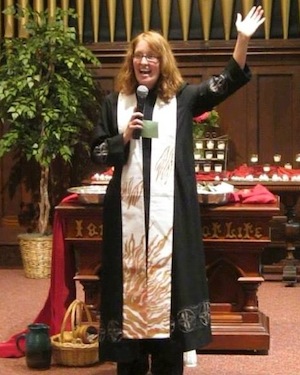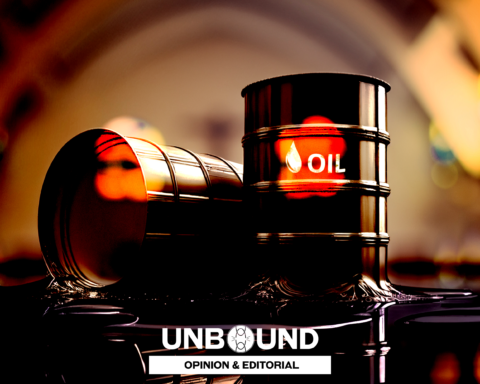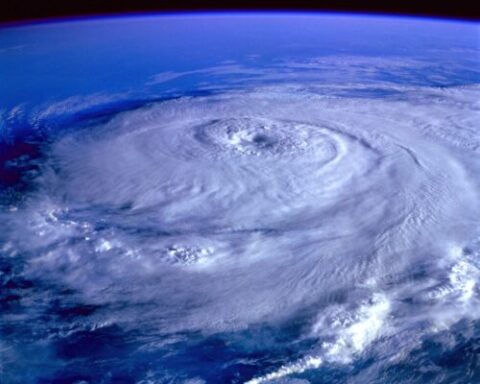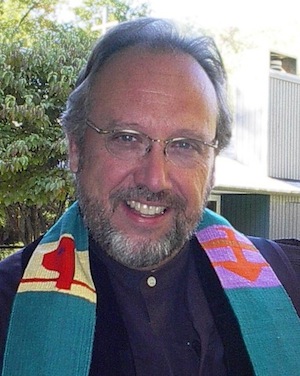
This week’s mini-series is a collaborative effort with Ecclesio. Check out these and other articles at www.ecclesio.com.
In our time of climate change, what does it mean to gather at the Table? Can our thanksgiving and intercession, our taking, blessing, breaking, and sharing bread, shape our response to the entire creation? How might our practice affect, and be affected by, the whole earth community?
Recently, my church held an educational program on climate change. The youth in particular showed how well informed they were about the problem of climate change, quickly and accurately answering questions about what the world might look like in fifty years (hot, dry, crowded, species extinction). However, I found myself later talking with a friend about what was missing – the piece we left unsaid. When asked about the future of our planet, we were all so quick to jump to how challenging and awful the world will be in fifty years as it suffers the effects of global warming. What no one named is what the world could look like in fifty years, if right now we started enacting the alternative we wish to see.
___________________________________________
I want us to consider what we do to ourselves, to the church, and even to climate change activism, when we stop after naming the problem.
___________________________________________
Admittedly, the world we live in is scary. We do need to talk about it, and we need to be sure that we all know what “prizes” we can fairly expect at the end of our game of constant growth, energy consumption, and disconnect from the wider earth community. With so many people in the United States actively denying the reality of global climate change, it feels absolutely critical to continue educating about the life-endangering effects that human activities are having on our world. We still have a lot of convincing to do, certainly much more than in the many countries where people no longer see this as a political conversation but rather as a lived reality. So, in the States, we rightly spend time talking about the basic science behind climate change, the 97% of scientists who agree that human activities are causing it, and their predictions of what it means for the future (many of which are already coming true in horrific ways).
 However, I want us to consider what we do to ourselves, to the church, and even to climate change activism, when we stop after naming the problem. Naming the problem is important, but we are called to do more: to vision and begin to embody an alternative future. Our Christian faith calls us to purchase renewable energy, divest from fossil fuels, and advocate for policy changes. It also invites us to gather at the Table of our Lord. I believe that the church gathered at the Table can begin to build an inclusive ethos of a whole earth community, can cast a hopeful vision for our future, and can practice now in order to become the world we yearn to be.
However, I want us to consider what we do to ourselves, to the church, and even to climate change activism, when we stop after naming the problem. Naming the problem is important, but we are called to do more: to vision and begin to embody an alternative future. Our Christian faith calls us to purchase renewable energy, divest from fossil fuels, and advocate for policy changes. It also invites us to gather at the Table of our Lord. I believe that the church gathered at the Table can begin to build an inclusive ethos of a whole earth community, can cast a hopeful vision for our future, and can practice now in order to become the world we yearn to be.
Communion is a chance to become the Beloved Community here on earth as it is in heaven. We regularly gather, share, imagine, taste and see God’s goodness, and recommit ourselves to the work of being disciples. This is an opportunity to en-courage (give courage to) a new vision.
We can begin by expanding our sense of who is invited to the Table, knowing that Christ came to save the whole cosmos (John 3:17). The Beloved Community includes all parts of God’s creation, thriving together. We gather and pray and confess that God’s grace and power are not for humans alone.
___________________________________________
In Communion, we use elements that can only be produced by cooperation between the earth, human labor, and the blessing of God.
___________________________________________
Then, we face the current state of affairs and hold it in balance with our faith. At the Table we proclaim Jesus’ death until he comes again. In so doing, we as material beings practice accepting death while simultaneously holding onto the anticipation of new life. We trust in God’s presence and power, even as we do not shy away from the harsh realities of suffering and death. We face death – we are honest about it – because we believe that we will feast on hope.
 As Bill McKibben fairly argues in his book Eaarth, we are already living on a whole new planet that has radically changed in such a way that we cannot go back to the way things were. There is death. We are chewing up the planet. We should not and cannot deny the realities. We can, however, face them with courage, vision, and commitment.
As Bill McKibben fairly argues in his book Eaarth, we are already living on a whole new planet that has radically changed in such a way that we cannot go back to the way things were. There is death. We are chewing up the planet. We should not and cannot deny the realities. We can, however, face them with courage, vision, and commitment.
From our biblical ancestors to the prophets to the incarnate Christ, we live in a tradition that calls for something more, something deeper, something more holy than what now is. Even when the world is bleak and we might rightly despair of hope, we hold on.
We hold on by taking ordinary, everyday elements and saying that they are signs and seals of God’s extraordinary grace. In Communion, we use elements that can only be produced by cooperation between the earth, human labor, and the blessing of God. The ingredients of the meal at this table include soil, microorganisms, sunlight, plants, human ingenuity, sweat, and the grace of God. Right in front of us, we see the Beloved Community working together to produce something good. We cannot have the Communion meal if we do not have communion with the earth. We need God’s creation to participate with us in creating this meal.
This act of proclaiming death while holding onto hope, of combining natural elements with human community and God’s blessing, can help us to face the challenges of climate change and to live with integrity as part of creation. We become energized to act on climate change policies and to change our individual and corporate practices that harm the earth. We do not minimize the pain and suffering of now, but neither do we give over to despair or apathy. We chart a new way forward that has the earth community at Table together, practicing for a new world.
___________________________________________
With climate change as our reality, we hold a broken world just like Jesus held blessed, broken bread.
___________________________________________
With climate change as our reality, we hold a broken world just like Jesus held blessed, broken bread. We lift this climate-change-broken world to God. We connect our Communion prayers and praise, our confessions and lamentations, to the earth, making explicit the connections already implicit in Communion.
When we receive God’s grace through the sacrament of Communion and the gift of a sacred world, we can then offer our own blessing of the earth. Macrina Wiederkehr says that, “to bless is to put a bit of yourself into something. It is to make holy, to change something or someone because of your presence.”[1] What would happen if, instead of simply assenting intellectually to the facts and threats of climate change, we entered into the climate change crisis, blessing it through our sweat, our love, our active advocacy, and our ongoing vision for something beautiful? We can put a bit of ourselves into this earth.
 Farmer, activist, and Kentucky author Wendell Berry writes, “To live, we must daily break the body and shed the blood of Creation. When we do this knowingly, lovingly, skillfully, reverently, it is a sacrament. When we do it ignorantly, greedily, clumsily, destructively, it is a desecration.”[2] The Christian sacrament of Communion acknowledges that we are at the same time embodied, physical, dependent, material beings and beings blessed with a spirit that reaches for connection outside ourselves. It matters how we engage in the sacrament and how it affects our living in the broader world. We put a bit of ourselves more fully and firmly “in.” We seek to become a vessel of God’s grace for this hurting world. We accept God’s call to move from the Communion Table to creation’s varied “tables,” going forth from church walls to the world around, spreading grace and healing for the entire earth community.
Farmer, activist, and Kentucky author Wendell Berry writes, “To live, we must daily break the body and shed the blood of Creation. When we do this knowingly, lovingly, skillfully, reverently, it is a sacrament. When we do it ignorantly, greedily, clumsily, destructively, it is a desecration.”[2] The Christian sacrament of Communion acknowledges that we are at the same time embodied, physical, dependent, material beings and beings blessed with a spirit that reaches for connection outside ourselves. It matters how we engage in the sacrament and how it affects our living in the broader world. We put a bit of ourselves more fully and firmly “in.” We seek to become a vessel of God’s grace for this hurting world. We accept God’s call to move from the Communion Table to creation’s varied “tables,” going forth from church walls to the world around, spreading grace and healing for the entire earth community.
Communion connects us outside ourselves—to God and to God’s creation. Communion connects us as material beings to the rest of the matter around us. Are we engaging in Communion with knowledge, love, skill, and reverence? Are we doing the same with our lives? If we are to become God’s Beloved Community, we must share this meal in order to proclaim the good news of God’s saving love for the whole world. In communion with our Triune God, we honor the creation that makes this holy meal possible, we practice becoming an inclusive Beloved Community, we act with reverence and dignity for the earth, and we lovingly embrace a vision of the beautiful future that we believe God intends.
[1] Joyce Rupp, The Cup of Our Life: A Guide for Spiritual Growth (Notre Dame: Ave Maria Press, 1997), 135.
[2] Wendell Berry, (Berkeley: Counterpoint, 2002).
AUTHOR BIO: Rebecca Barnes is the Associate for Environmental Ministries for the Presbyterian Church (USA), where she oversees the national PC(USA) certification program for Earth Care Congregations, coordinates the volunteer local leadership network called the Environmental Ministries Action Network, and works to help Presbyterians connect their Christian discipleship to ecological, economic and global justice concerns. In her local community, Rebecca organizes the Eco-Justice Worship Collective, an initiative to create dynamic, ecumenical, inclusive worship spaces to engage in eco-justice concerns. She likes reading, writing, yoga, art, dancing, and playing imaginary games with her two children.
Read more articles in this series.






Unbound Social